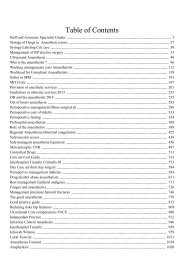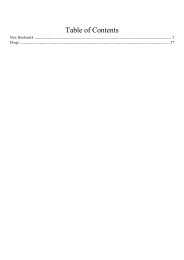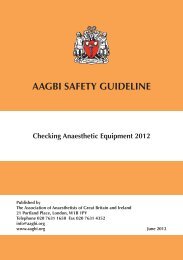pdfjoiner
Create successful ePaper yourself
Turn your PDF publications into a flip-book with our unique Google optimized e-Paper software.
Definitions<br />
The times that can be considered to be “out of hours” (OOH) may be defined contractually or by reference to<br />
published national standards. In the current Consultant Contracts for England and Wales, OOH is defined by<br />
the concept of “premium time”, i.e. that which is outside of 07.00 h – 19.00 h on non-Bank Holiday weekdays.<br />
Current and future contract negotiations may change the periods covered by “premium time”. The National<br />
Confidential Enquiry into Patient Outcome and Death (NCEPOD) defines OOH as: “any time outside 08.00 to<br />
17.59 on weekdays, and any time on a Saturday or Sunday”. We will simply define OOH work as that done<br />
outside of the normal working week.<br />
Emergency work<br />
Anaesthetic services delivered OOH are key to the provision of emergency care. Anaesthetists will<br />
reasonably be expected to provide OOH cover for cases that come under the NCEPOD Classification of<br />
Intervention as being “Immediate” or “Urgent”. Following clinical assessment, those cases classified as being<br />
“Expedited” or “Elective” need not be done OOH. Immediate or urgent cases should be prioritised over<br />
routine / elective care at all times.<br />
Drivers for increased OOH activity<br />
The NHS has always operated a 7 day service for patients requiring emergency admissions and surgery.<br />
There is current pressure towards a “7-day NHS” based on the information that some patients admitted to<br />
hospitals at the weekend have worse outcomes compared with those admitted during the working week. It<br />
seems likely that more consultants will be required to be present in hospitals at the weekend, along with<br />
support services. In some units it may be inevitable that the increased workload combined with sicker<br />
patients with increased co-morbidity will require Consultant Anaesthetists to be in-hospital providing resident<br />
shifts during part of the OOH period. The AAGBI and RCOA support measures to improve patient safety and<br />
quality of care but note that this will have a significant impact on Anaesthesia workforce. It has been<br />
suggested that with increased support services, it would be safe to perform elective operating lists at the<br />
weekend, and the principle of elective work OOH in the form of ‘Waiting List Initiatives’ is well established.<br />
Standards and operating procedures developed to make patient care as safe as possible during normal<br />
working hours would be maintained for any elective care taking place out of hours. This should not be seen<br />
as a solution to the failure to carry out this work successfully in normal hours during the week. An increasing<br />
emergency workload and pressure on beds will increase the demand for daily trauma and emergency lists to<br />
expedite surgery and speed patient throughput. Extending planned surgery throughout the week could<br />
enable existing operating theatres to be used for more hours than at present, although it must be noted that<br />
over 70% of theatre running costs relate to staff, drugs and disposables (information available on line from<br />
Information Services Division, NHS Scotland).<br />
The risks of OOH working<br />
Different risks are posed by OOH working in the evening and overnight to working daytimes at weekends.<br />
There are physiological differences between working during the day, and in the evenings or at night and<br />
these differences cannot be fully mitigated. This must be taken into consideration when OOH working is<br />
considered 1 . Studies have shown that human beings do not adapt despite prolonged exposure to night<br />
work 2 . Working in the evening or night especially after having worked during the day may lead to significant<br />
fatigue, as may work at weekends after a full working week 3 . A further factor in fatigue experienced by<br />
anaesthetists is sleep disturbance caused by shifts and irregular patterns of work. Fatigue is associated with<br />
an increased incidence of critical incidents and thus has a direct impact on patient safety 4 . There are<br />
significant additional risks in OOH working that should be mitigated by limiting night-time work to that which<br />
is clinically necessary and adjusting working patterns and arrangements to minimise fatigue. Onsite facilities<br />
that help mitigate the effects of fatigue, such as the timely availability of healthy foods and appropriate areas<br />
for rest, are important to the delivery of safe OOH care.<br />
Patient considerations<br />
Patients should receive appropriate treatment to national standards of care from competent and fit–for-work<br />
clinicians in a timely fashion. However, there must be a balance between the need for speed with which<br />
urgent and expedited surgery is performed in order to minimise the pain and anxiety, and the need to<br />
maintain standards of safety if the provision of OOH is increased. Patient safety must always be prioritised<br />
over patient convenience.<br />
2





